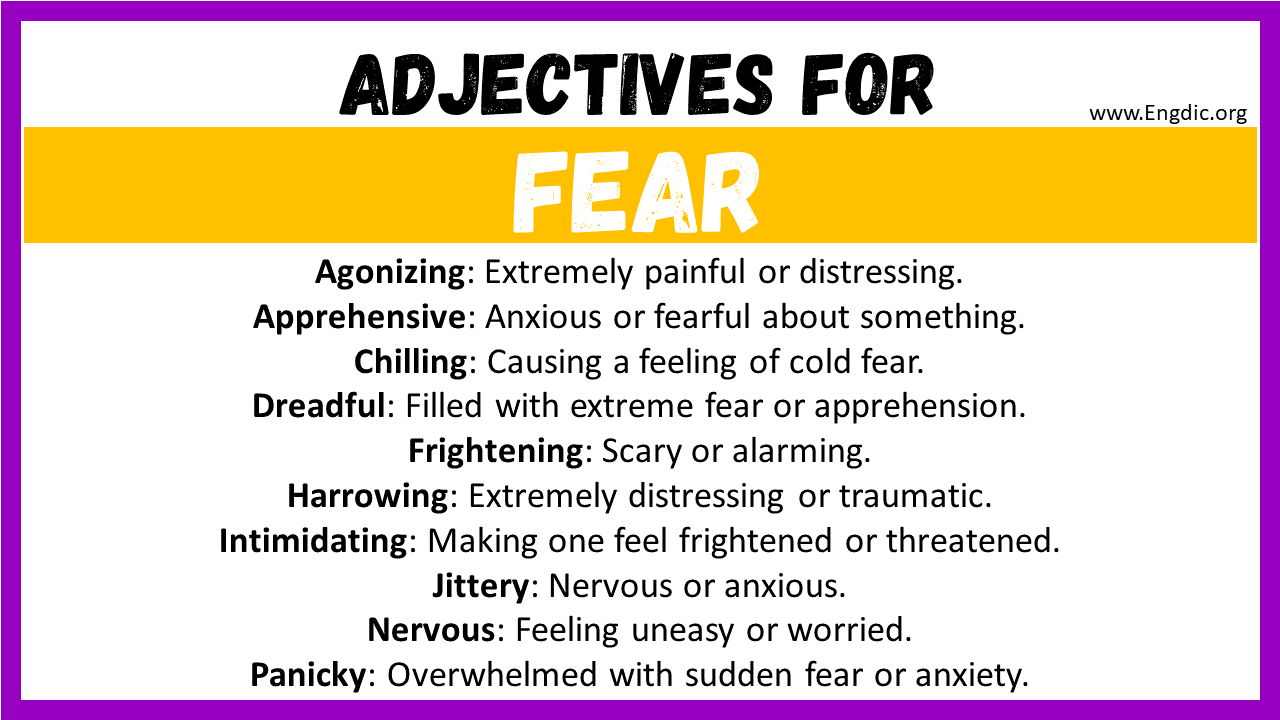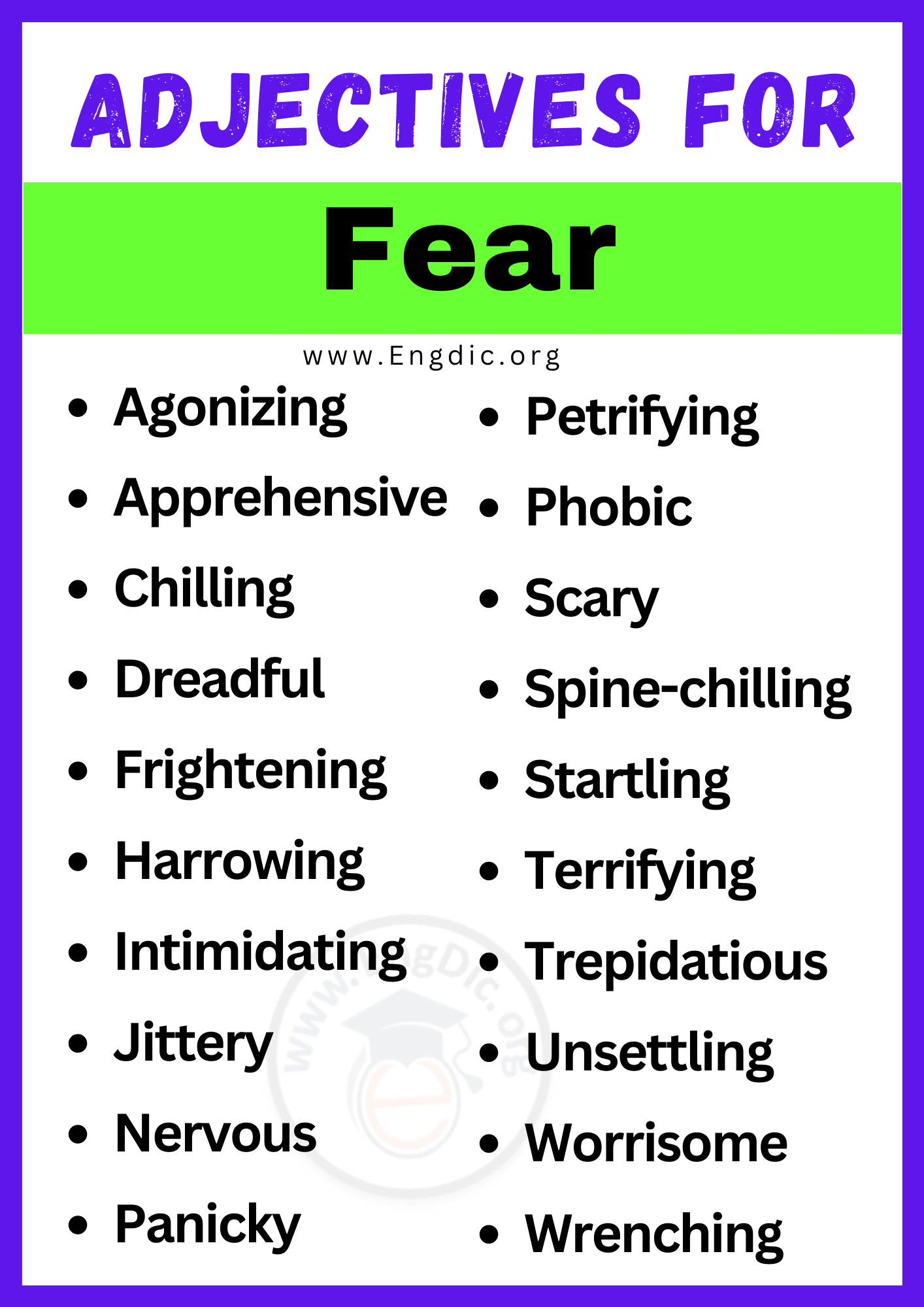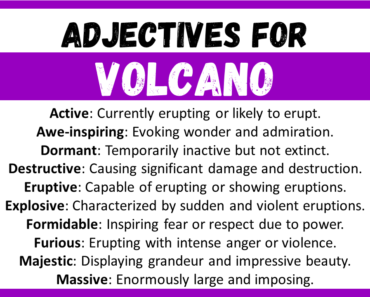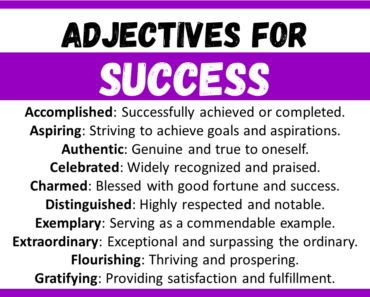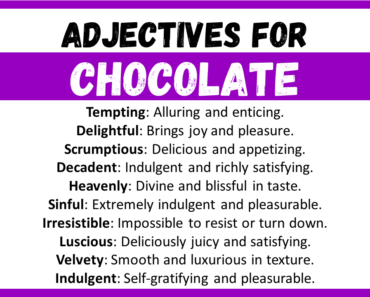Fear is an emotion that we all experience at some point in our lives. It is an unsettling feeling that arises when we perceive a threat or danger. When words are used to describe fear, they encapsulate the wide range of emotions and sensations that accompany this primal response. From anxiety and dread to terror and panic, these words convey the intensity and complexity of our fear. Join us as we delve into the rich tapestry of words that capture the essence of this universal human experience.
Adjectives for Fear
Here are the 20 Most Popular adjectives for fear:
- Agonizing
- Apprehensive
- Chilling
- Dreadful
- Frightening
- Harrowing
- Intimidating
- Jittery
- Nervous
- Panicky
- Petrifying
- Phobic
- Scary
- Spine-chilling
- Startling
- Terrifying
- Trepidatious
- Unsettling
- Worrisome
- Wrenching
Words to Describe Fear with Meanings
- Agonizing: Extremely painful or distressing.
- Apprehensive: Anxious or fearful about something.
- Chilling: Causing a feeling of cold fear.
- Dreadful: Filled with extreme fear or apprehension.
- Frightening: Scary or alarming.
- Harrowing: Extremely distressing or traumatic.
- Intimidating: Making one feel frightened or threatened.
- Jittery: Nervous or anxious.
- Nervous: Feeling uneasy or worried.
- Panicky: Overwhelmed with sudden fear or anxiety.
- Petrifying: Paralyzingly terrifying or frightful.
- Phobic: Having an extreme or irrational fear.
- Scary: Causing fear or alarm.
- Spine-chilling: Sending shivers down the spine.
- Startling: Surprising or shocking, causing sudden fear.
- Terrifying: Instilling intense fear or terror.
- Trepidatious: Feeling hesitant or fearful.
- Unsettling: Disturbing or causing unease.
- Worrisome: Causing worry or concern.
- Wrenching: Causing intense emotional distress or anguish.
Example Sentences for Fear Adjectives
- The agonizing pain in her leg made it difficult to walk.
- He felt apprehensive about speaking in public.
- The chilling wind sent shivers down her spine.
- It was a dreadful experience that she would never forget.
- The horror movie was incredibly frightening.
- The survivor shared his harrowing tale of escape.
- His intimidating presence made everyone uneasy.
- She was jittery before her job interview.
- The nervous student chewed on her pen during the test.
- The loud noise made him panicky and anxious.
- The haunted house was petrifying to walk through.
- She developed a phobic fear of spiders.
- The horror movie was so scary that she couldn’t sleep.
- The suspenseful book had several spine-chilling
- The sudden loud noise was startling to everyone.
- The roller coaster ride was absolutely terrifying.
- He felt trepidatious about making the important decision.
- The strange noises in the old house were unsettling.
- The worrisome news kept her up all night.
- The wrenching breakup left him heartbroken and devastated.
Explore More Words:
Words to Describe Appreciation
FAQ’s
How to describe fear in writing?
Fear can be described in writing by using vivid and descriptive language, capturing the physical and emotional sensations it brings, such as trembling, racing heart, and paralyzing dread.
What is the strongest word for fear?
The strongest word for fear is “terror,” which conveys an intense and overwhelming feeling of extreme fear and dread.
What is a fancy word for scared?
A fancy word for scared is “timorous,” which implies being timid, fearful, or easily frightened.
